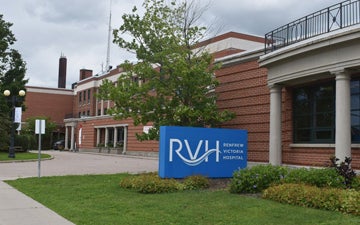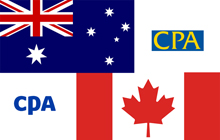Report finds healthcare dollars went to former CEO and executive instead of healthcare

Provincially appointed supervisor calls Renfrew Victoria Hospital use of same auditors for more than 35 years a poor financial practice as OPP investigates
RENFREW, ON, June 11, 2025 – The final report into financial irregularities at Renfrew Victoria Hospital (RVH) outlined a disturbing misallocation of millions of healthcare dollars, mostly in double compensation, a $1 million interest free loan, a $1.3 million double pension plan and other perks to the former CEO.
“In total, this former RVH CEO is estimated to have received over $1.6 million in compensation on top of their RVH CEO salary plus a $1 million interest free loan and $1.3 million SERP (pension plan),” the report by Supervisor Altaf Stationwala stated. “Other former RVH executives also received compensation from RH (Renfrew Health) in addition to their RVH compensation. In total nearly $3 million over 11 years was spent in executive compensation through Renfrew Health (RH) for RVH executives with no demonstrated roles or accountabilities within RH.”
The report, completed in late April and released publicly last week, confirmed the allegations which were made public two years ago of financial impropriety between RVH and RH, but in earlier press releases there was no indication of financial gain for the former CEO or other executives. This report outlines in great detail a trail of double compensation, extra perks and activities not normally associated with hospitals built into the relationship between RVH and RH.
The “former longtime CEO” was not named in the report, nor were the other three senior executives, or the accounting firm used by RVH which was also criticized.
Randy Penney retired as CEO in 2020 after 30 years as RVH president and CEO and was described in an article in the Leader at the time as “one of the most regarded hospital administrators in the province of Ontario, if not the nation.” In 2021, the hospital unveiled a Randy Penney Education Centre in his honour. Julia Boudreau, who had been in the senior management team, became CEO following Mr. Penney and resigned shortly after Mr. Stationwala began his investigation.
When he was appointed as supervisor in 2024, most in Renfrew and the surrounding community were surprised to hear of the allegations of financial irregularities because RVH has had an outstanding reputation in the community and the province. The hospital received accreditation with exemplary standing in recent years, which in itself involves assessments on leadership and governance.
However, despite the excellent reputation of RVH among community members, the findings of the report present a disturbing pattern of spending healthcare dollars on executive compensation, primarily to the former longtime CEO, and unorthodox practices including paying RVH through RH for work they were already doing at RVH as part of their roles, in essence double dipping with healthcare dollars. Describing RH as a “superficial structure,” Mr. Stationwala noted when he began his plan to dissolve RH and reunify assets with RVH, it was apparent all the activities were already being managed by executives at RVH as part of their regular duties.
“The creation of RH did not free up RVH executive time, as RVH executives did all of the work of RH as well, while benefitting from over $2.7 million in management salaries over the course of its mandate,” he said.
“Ultimately, the completed puzzle reveals a lack of sound governance and specifically, a lack of standard checks and balances in relation to executive decision making, particularly in relation to executive compensation,” the report concluded. “With nearly $3 million directed into executive compensation alone, notwithstanding legal costs and other misguided spending of public dollars, the ultimate impact unfortunately comes at a loss to the community that could have benefitted from investment of these funds into expanded healthcare services.”
Concerns Over Funds Transfer
When Mr. Stationwala was appointed as supervisor of RVH the initial concern was the transfer of hospital funds to RH which had been established to support the operations of RVH. In his report he said he initially believed the hospital was using RH to “bypass rigorous hospital financial practices which stood to benefit RVH executives getting paid out of this entity.
“What I discovered upon further investigation and due diligence was that RH was just one piece of a larger puzzle pertaining to a series of irregular transactions and practices involving certain former executives,” he stated.
The report showed the hospital regularly was in a surplus but decisions were made internally under the auspice of having limited financial resources such as under investment in clinical resources to improve access to care, as well as gaps in security and a lack of investment in administrative and governance structure.
“Meanwhile, certain executives were being compensated via RH in addition to RVH compensation and a longstanding former Chief Executive Officer (CEO) with a tenure of over 30 years received both RH compensation and a range of other financial arrangements including a Supplementary Employee Retirement Plan (SERP) and an approximately one-million-dollar interest free loan,” the report stated. “There were also concerns regarding such former executive’s use of company credit cards. These practices began at RVH as early as 1997 and continued until recently.”
The report pointed out SERP is not common in hospitals since the hospital already has a pension plan known as the Healthcare of Ontario Pension Plan. However, RVH contributed at least $1,254,625 over 25 years to a trust for the former CEO and this was never disclosed publicly. The same former CEO was also given a $1 million interest free loan for a personal property purchase and renovations on the premise of CEO retention. The former CEO also received $100,000 “transitional allowance which was not part of salary disclosures or public expense disclosures. Shortfalls in the repayment of the loan resulted in a write off of $95,744.
The loan had stipulated if the property sale was less than the amount outstanding on the loan, RVH would accept the net proceeds as full repayment, resulting in the shortfall. Mr. Stationwala also noted “it is highly unusual and not recommended practice for a hospital to provide a loan to its employees.”
The former CEO spent over $170,000 over six years using company credit cards and only nine percent of the expenses were supported by receipts.
“It also appears that personal expenses were charged to company credit cards, including health related expenses, home internet, personal travel, cash advances and other expenses,” he stated.
The report showed all RH staff were also RVH employees and they benefited from a “management fee” despite carrying out activities that were consistent with their jobs at RVH.
“From 2014 to 2023, over $2.7 million in executive compensation was paid through RH, including approximately $1.6 million to a former RVH CEO. Through RH, such former CEO was also paid an estimated additional $660,000 related to accrued vacation and statutory holiday banks which were accumulated during the former CEO’s tenure at RVH,” the report stated.
The report shows four RVH executives benefited with payments of between $1.6 million and $374,000 for their roles at RH although the report noted they were already being paid by RVH.
“The former CEO was also paid approximately $660,000 from RH related to accrued vacation and statutory holiday banks which were accumulated during their tenure at the hospital,” the report added, noting this was done so the payments would not be subject to executive salary reporting.
It was noted RVH had used the same auditors for over 35 years which “further propagated these questionable activities.”
The report also pointed out this firm had questionable audit practices, including the decision to leave RH out from RVH financial statements.
St. Francis Memorial Hospital
Mr. Stationwala also pointed out RVH executives benefited from their roles at St. Francis Memorial Hospital in Barry’s Bay. There was no evidence of any disclosure to the RVH Board with respect to compensation or workload distribution of executives supporting both hospitals, the report stated.
“Further adding to the compensation equation is that RVH executives have an integrated senior management team with St. Francis Memorial Hospital (SFMH) in Barry’s Bay. This represents yet another source of compensation that would be reported separately from RVH, resulting in further understatement of public disclosure of overall executive compensation. There are also cases of duplicated benefits, such as two car allowances between RVH and SFMH.”
Questions Raised in 2023
The report noted a concerned citizens group wrote a letter in 2023 to Ontario Health raising concerns regarding financial practices between the hospital and RH. There were concerns about $6,595,000 moved from RVH to RH and compliance with reporting requirements. Following ongoing discussions, the decision was made to appoint Mr. Stationwala as supervisor. There was also a confidential KPMG independent review.
“A detailed review of financial practices revealed a range of financial irregularities pertaining to actions of former longstanding RVH CEO of over 30 years,” the report stated. “There is a recurring theme of poor business and governance practices that enabled this activity to persist over many years. The RH construct was misused from the beginning through the redirection of RVH operating funds and payments to RVH executives. This was increasingly carried out over time with the continued movement of significant RVH operating funds, vacation banks, bonus payouts, and other activities that should have been under purview of the hospital.”
The report showed rather than investing RVH surpluses into hospital needs, instead in several years surpluses in excess of $300,000 were transferred to RH. This resulted in under investment in hospital functions, including nursing, physiotherapy and social work coverage, increasing nursing hours in oncology, increasing diagnostic imaging hours and expanding biomedical services.
Following the commencement of the investigation in 2023, the board at RH approved the return of $6 million of surplus funds back to RVH.
“During the time of the OH East review, the former RVH CFO undertook an assessment of the appropriateness of funds that could have been transferred by RVH to RH and determined this was approximately $6.1 million, compared to the total of $11.7 million that had actually been transferred during that time. Accordingly, the RH Board approved the return of $6 million of surplus funds back to RVH in 2023,” the report concluded.
“In addition to transfer of surplus funds from RVH, RH received $2.5 million from the Renfrew Victoria Hospital Foundation (RVHF) (parking revenues), $1.5 million from operation of the Sleep Store, and $6 million from other sources such as investment and rental income,” the report noted.
Mr. Stationwala highlighted in his report a detailed financial analysis indicated no donor funds were transferred from the Renfrew Victoria Hospital Foundation to RH.
In November the Ontario Provincial Police launched an investigation into RVH conducted through the Anti-Rackets Squad, which investigates financial crime and fraud.
Debbi Christinck is a Local Journalism Initiative reporter with The Eganville Leader in Renfrew County, Ontario. Title image: Renfrew Victoria Hospital [Christinck].





(0) Comments